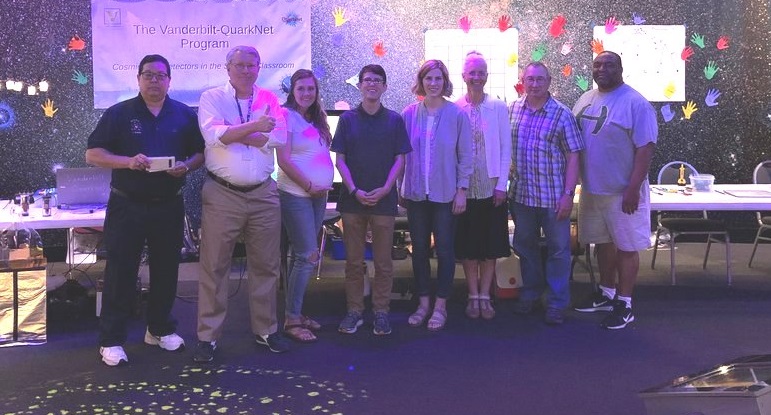Friday Flyer - November 15, 2019

Spotlight on the Vanderbilt University QuarkNet Center
The Vanderbilt center has been very active in the past year. Mentor Bill Gabella and the teachers are active in maintaining and using cosmic ray detectors; in fact, they did all the GPS updates from last spring right there at Vanderbilt rather than send the GPS boxes out to be fixed. The summer workshop started out with talks on particle physics, including CMS and RHIC, moved on to setting up a cosmic ray telescope, and concluded with two days of preparation for outreach at the Nashville Adventure Science Center. That enabled them to spend time bringing particle physics to children and families with activities from "Particle Slam" using LEGOs to simulate high-energy physics experiments to a cosmic ray detector with an oscilloscope running to show muon signal pulses. By the way, you may want to check them out on their Facebook page, where the Vanderbilt center keeps the conversation going.

Adventure Science Center for outreach.

News from QuarkNet Central
We are right in the middle of the registration interval for International Masterclasses! Center leaders, now is a great time to check for dates that work for your teachers and their students. We use Doodle polls to register and each time slot is limited to five institutes. Breaking News: The deadline for Fermilab Doodle polls has been extended to December 8! (After that, you must register by e-mail.) Go to the CMS Doodle, the ATLAS Doodle, or the MINERvA Doodle for Fermilab videoconferences. There are videoconferences hosted at CERN, GSI (Germany), and KEK (Japan) as well. See the latest International Masterclasses Circular, which just came out today.
Oops! We made a mistake! Early Bird Registration for the 2020 AAPT Winter Meeting in Orlando ends November 26. (We'd originally stated it was the 11th. Our apologies!) Reasons to go: a workshop on the updated CMS masterclass, a tutorial on "Activities for Teaching Contemporary Physics" that includes simple hands-on work as well as a longer-term cosmic ray project, and a session on "21st Century Physics in the Classroom." And we'll try to get a QuarkNet gathering together too.
Beamline for Schools (BL4S) proposals are due March 31, 2020; learn more at the BL4S website.

Physics Experiment Roundup
Accelerator progress, well, accelerates. CERN Courier gives us some useful updates on work on LHC interconnections and a new scintillating fiber tracker for LHCb. Fermilab News reports on making the world's most powerful neutrino beam but also on finding a new kind of particle beam instability, the understanding of which can lead to better accelerators.
Back to CERN and up into space: Watch the spacewalk that happened today to service the Alpha Magnetic Spectrometer experiment on ISS. Note that it's quite long and nothing happens for the first minute of the video. That said, the intro looks good and one can pick the best parts to watch, or it can be the ultimate binge physics TV.

Resources
Eigenvectors...eigenvalues...Remember the fun in undergraduate physics. Well, they are key to understanding the flavor states of neutrinos at the theoretical level and, lo and behold, it turns out that neutrino physicists made a fundamental mathematical discovery about their relationship, according to Quanta. Nobel-level work? We don't know, but here is a lesson on the Nobel Prize for students to start to figure that out.
Do you know a student or two who likes physics and medicine? They might be interested in physicists going into medical physics, as explained in symmetry.

Just for Fun
Love skateboarding? We bet some of your students do, so here is a video by Physics Girl on the physics of same. Non-trivial. And since we are geeking on one video, let's double it with some Star Wars (bad) physics.
QuarkNet Staff:
Mark Adams: adams@fnal.gov
Ken Cecire: kcecire@nd.edu
Shane Wood: swood5@nd.edu
